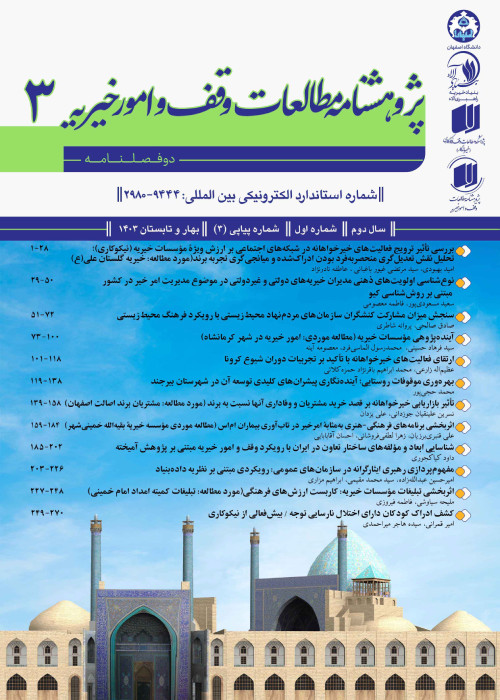The Impact of Authentic Leadership on Organizational Trust of Employees (Case Study: Isfahan charities)
One of the problems of organizations is the lack of trust between managers and employees. The lack of trust causes the loss of the organization's resources and the failure to achieve its goals. Organizations need managers who become leaders to build trust. Authentic leadership is an organizational leadership style that is based on the integrity of leaders in the workplace. Trust, and in particular trust in leadership, is an essential and enduring component in the success of an organization, and authentic leadership is defined as being trustworthy (Rog, 2021). Authentic leadership includes a multifaceted process in which leaders seek to establish effective communication with employees based on trust (Sheikh et al., 2022). When employees trust their leaders, they have fewer negative feelings leading to a better performance (Anthony et al., 2021). According to Gardner and Schermerhorn (2019), authentic leadership has a significant impact on positive organizational behaviors such as trust. One of the important factors in creating trust is the presence of authentic leaders in the organization. This research is innovative because it studies charities and examines the element of trust, which is one of the most important factors in choosing a charity. The objective of this research is whether authentic leadership affects organizational trust or not.
The current research is practical in terms of purpose, and in terms of the nature and method of data collection, it is descriptive survey research of the field type. The statistical population of the study is 500 employees of charities in Isfahan City in various fields such as healthcare, livelihood, empowerment, and marriage. This statistic was obtained by an inquiry from the social affairs office of Isfahan governorate. The sample size was calculated as 217 people based on the table of Karjesi and Morgan. The sampling approach in this research is the Convenience Sampling method. The questionnaire covered 28 specific questions, in which the authentic leadership variables included four dimensions of self-awareness, balanced processing, relational transparency in the relationship, and internalized moral perspective. The organizational trust variable includes three dimensions horizontal, vertical, and institutional trust. Content and construct validity methods were used to assess validity. In terms of construct validity, first-order confirmatory factor analysis in AMOS software was implemented. The factor loadings of the questions were examined and the factor loadings of all questions were greater than 0.5, so the construct validity was confirmed. Cronbach's alpha was used to measure reliability. Statistical analysis was done by SPSS and AMOS software.
According to the findings, 75% of respondents were male in terms of demographic characteristics. In terms of education, most of the respondents had a bachelor's degree, and in terms of work experience, most of the respondents had more than 12 years of work experience. Kolmogorov-Smirnov test was used to check the normality. The data were normal. Table 1: Test of Normality .Table 2: The result of the test of research hypotheses According to Table 2, since the value of the significance level in all hypotheses is less than 0.05 and the critical value is greater than 1.96, the hypotheses are confirmed.
The results of the first hypothesis showed that authentic leadership has a positive and significant effect on organizational trust. One of the most important tools for the success of charities is trust. Trust in charities is two-way, in the sense that both benefactors and employees should trust charities. Since most charities are dependent on benefactors for their activities, charities will face problems if benefactors do not trust them. The findings based on the second hypothesis showed that authentic leadership has a positive and significant effect on employees' horizontal trust. The results of the present study show that authentic leadership can increase the horizontal trust of employees. The key to increasing horizontal trust is developing communication between individuals. A strong communication network can increase people's awareness and consequently reduce conflicts and disputes. The findings based on the third hypothesis showed that leadership has a positive and significant effect on employees' vertical trust. Vertical trust in charity organizations can be interpreted as the trust of benefactors in managers and also the trust of employees in their higher managers. The findings based on the fourth hypothesis showed that authentic leadership has a positive and meaningful effect on the institutional trust of employees. Institutional trust is to assure the stakeholders about the goals and strategies of the organization and attract their participation to cooperate in this field. To create transparency, the charity managers are suggested to provide the financial performance of the charity to the public monthly. Also, charities should evaluate their activities with the help of an auditor and publish the auditor's reports publicly.
- حق عضویت دریافتی صرف حمایت از نشریات عضو و نگهداری، تکمیل و توسعه مگیران میشود.
- پرداخت حق اشتراک و دانلود مقالات اجازه بازنشر آن در سایر رسانههای چاپی و دیجیتال را به کاربر نمیدهد.


